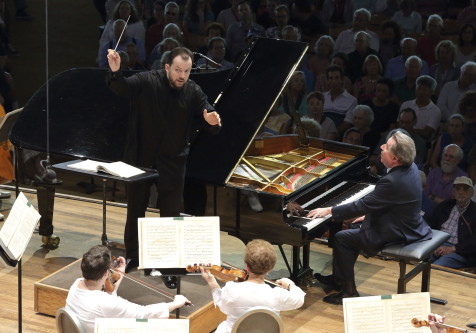 United States 2018 Tanglewood – Brahms and Shostakovich: Rudoph Buchbinder (Piano), Boston Symphony Orchestra / Andris Nelsons (conductor), Koussevitzky Music Shed, Lenox, MA, 8.7.2018. (CSa)
United States 2018 Tanglewood – Brahms and Shostakovich: Rudoph Buchbinder (Piano), Boston Symphony Orchestra / Andris Nelsons (conductor), Koussevitzky Music Shed, Lenox, MA, 8.7.2018. (CSa)

Brahms – Piano Concerto No.1 in D minor
Shostakovich – Symphony No.5 in D minor
This year, the BSO pays tribute to the late great maestro Leonard Bernstein, born 100 years ago. In the first Sunday afternoon concert of this year’s Tanglewood season, the orchestra replicated their first full programme under him in the last dark days of war, November 1944. Bernstein’s decision to couple Brahms Piano Concerto No.1 with Shostakovich Symphony No.5 was surely not a matter of pure chance.
Both works are outpourings by young men in response to painful and personally tragic events. The pieces are also in turns monumental and intimate, and remind us of the indestructibility of the human spirit, even in the darkest times.
Brahms was just 21 years old when his friend and mentor, Robert Schumann, suffered a deterioration in his mental health and attempted suicide. The 30-year-old Shostakovich wrote his symphony at the height of Stalin’s cultural purges. Forced to call it ‘A Soviet Artist’s Response to Just Criticism’, he succeeded in winning official approval after the regime’s devastating attack on his more dissonant opera Lady Macbeth of the Mtensk District.
The Brahms concerto is symphonic in form. Indeed, a symphony in D minor was the composer’s original intent. The rich orchestral texture can often result in thickness of tone and loss of fine detail, as soloist and orchestra struggle for domination. Not so last Sunday, when the celebrated Austrian pianist, Rudolph Buchbinder, making only his second Tanglewood appearance, and the orchestra under Andris Nelsons, achieved a perfect and delicate balance. Under his baton, or occasionally his bare hands, Nelsons carefully controlled his superb players – holding them back when restraint was required, and liberating them in the forte passages.
Buchbinder is an Austrian artist of great modesty. Rather than courting the audience with flamboyant gestures or exaggerated facial expressions, he communicates simply and directly through the music alone, and never gets in the way of his own performance. On this occasion, he offered us a stripped-down but nuanced interpretation of the work, which was directed straight at its emotional heart. From the opening arpeggiated chords and trills of the maestoso, the concerto’s magisterial first movement, orchestra and piano embarked on a conversation between equals. Buchbinder’s development of the chorale-like second theme was appropriately rich and sonorous, and his mighty ripostes equalled the orchestral bursts in the massive climax. In contrast, his account of the second movement, a prayerful and contemplative adagio, was beautifully phrased and wonderfully tender, and the meticulously played romp in the final adagio brought the work to a joyful and triumphant climax.
If the Brahms concerto was the main course of the concert’s first half, then the encore – a piano adaptation of a Strauss waltz from his operetta Die Fledermaus, which forms part of the light-hearted Soirée de Vienne by Alfred Grünfeld, provided us with a delicious Austrian dessert, a transport of delight from Tanglewood to the Vienna Woods
Nelsons’ transcendent reading of the Shostakovich Fifth Symphony was the highlight of the afternoon, and revealed the collective strength and depth of the BSO’s musicianship. In the symphony’s opening moderato, the strings introduced a melody of ineffable sadness, followed by a grotesque and ironic march reminiscent of Mahler. As the marshal music receded, the movement ended with a weeping violin solo, exquisitely played by Tamara Smirnova. The Scherzo offered a tongue-in-cheek parody of a waltz, while the third movement – a tragic and introspective Largo with an unbearably painful theme – gave way to the brutal and crazed Finale. ‘It is as if someone were beating you with a stick and saying ‘Your business is rejoicing’, wrote Shostakovich in his memoirs, Testimony.
Nelsons – who grew up in Latvia during the Russian occupation – well understands the political context of this great symphony. In last Sunday’s performance, he revealed not only this defiant work’s great beauty, but also its coded message of hope, even in dark times.
Christopher Sallon
For more about the 2018 Tanglewood Season click here.
